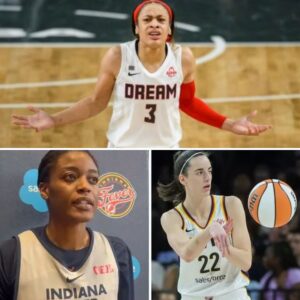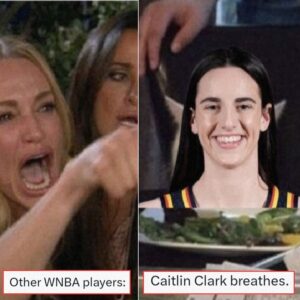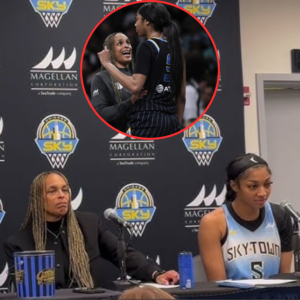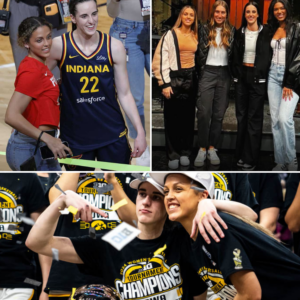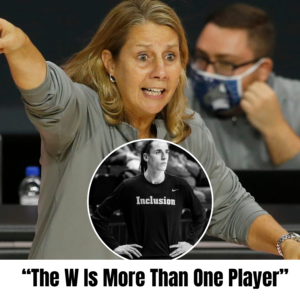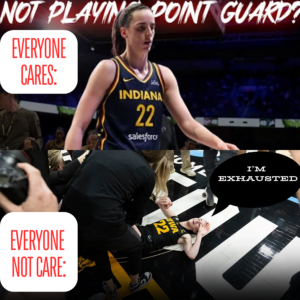As the WNBA experiences one of its most promising days, attention is directed towards a female athlete in a team sport like never before. Caitlin Clark embodies the potential to elevate basketball and all women’s sports to unprecedented heights.
However, the intense spotlight isn’t solely on Caitlin Clark. In recent weeks, it has also illuminated the players who preceded her. Some seem to struggle with accepting and managing her fame, despite the significant benefits it could bring them.
As Caitlin Clark led Iowa to its second consecutive NCAA final, despite a loss to undefeated national champion South Carolina, her performances garnered massive TV ratings that even surpassed men’s games for the first time ever. Understandably, prominent figures in women’s basketball, including superstars like Diana Taurasi and Breanna Stewart, couldn’t help but discuss her.
Stewart, a four-time NCAA champion at UConn, two-time WNBA champion, and two-time Olympic gold medalist, was asked on SiriusXM radio before the Final Four games:
“Does Caitlin Clark need a championship to be considered one of the greats in women’s college basketball history?”
Stewart had an easy layup with this question. It wasn’t about whether Clark needed a championship to be the greatest of all time (GOAT); instead, it was simply asking if Clark was “one of the greats.”
There can be numerous greats, as many as you want, and the more, the merrier. It’s logical to assume that someone who has scored the most points in NCAA Division I basketball history, regardless of gender—like Clark—would certainly be one of them.
But for Stewart, it wasn’t so simple.
“Yeah, she does (need a championship),” Stewart said coolly, without hesitation. “I think so. Because then you’re gonna look 10 years back and you’re gonna see all the records she’s broken, and the points and stuff like that, but anybody knows your goal when you play college basketball is to win a national championship. So you need one.”
Needless to say, Stewart’s response stirred up some controversy, and not in a positive way for the 29-year-old athlete. Her answer seemed peculiar, almost as if she were reluctant to acknowledge the groundbreaking impact of Caitlin Clark, who is over seven years her junior, on the perception of women’s basketball nationwide. Instead, Stewart appeared determined to maintain her focus on her UConn background, emphasizing the support she received from a roster filled with future WNBA players in winning her four titles. It’s worth noting that Clark, on the other hand, led Iowa to two consecutive NCAA finals with a roster primarily composed of non-WNBA players.
While it’s Stewart’s prerogative to express her views, her response raised eyebrows for its seeming lack of recognition of Clark’s accomplishments. However, Stewart’s agent, Lindsay Colas, declined multiple requests for an interview with Stewart. Finally, at Colas’ suggestion, I sent two questions via text for Stewart to answer, as she was reportedly out of the country.
Stewart and Taurasi’s remarks during the Final Four shed light on their perception of Clark, which could have implications if she were to become their teammate on the U.S. Olympic team this summer.
The push for Clark’s inclusion on the U.S. team, which seems like an obvious choice to me, is gaining momentum. Lisa Leslie, a three-time WNBA MVP and four-time Olympic gold medalist, stated, “She better be on the Olympic team. We should not leave the country without her. She’s a bona fide baller. There’s no doubt she’s already one of the best players in the world.”
However, there’s a palpable undercurrent that has caught the attention of the U.S. Olympic movement. If Clark is not selected for the Olympic team, it will undoubtedly raise serious questions about the influence of factors such as animosity or jealousy in that decision.
A recent intriguing event unfolded on social media when the Phoenix Mercury, Diana Taurasi’s team, shared a promotion for their June 30 home game against Indiana. The post featured Taurasi and another player in silhouette, wearing No. 22.
“The GOAT vs. THE ROOK,” the caption read.
Despite any potential reservations Taurasi might have, even her own team recognizes the significance of promoting her alongside Caitlin Clark.
News
“No bloody joke”: Temi Fagbenle gained social media admiration for defending Caitlin Clark and criticizing Chennedy Carter’s actions, exciting fans.
“No bloody joke”: Caitlin Clark’s teammate, Temi Fagbenle, has earned widespread admiration on social media for speaking out against Chennedy Carter’s undisciplined actions towards Clark. Fagbenle’s candid and strong defense of her teammate has struck a chord with fans and…
‘Wameh doing and Wameh things’: Despite advocating for “Women Empowerment,” they criticize Caitlin, claiming she doesn’t do anything that the other girls can’t do, so they have a right to be upset.
In the fast-paced world of basketball, where athleticism and skill are celebrated, there exists a paradoxical situation within the realm of “Women Empowerment.” Despite the rhetoric surrounding support for women in sports, there are instances where female athletes face criticism…
Teresa Weatherspoon Praises Angel Reese for Courageously Overcoming ‘Harsh Media Criticism’ That Made Many Angry and ‘Spout Profanity’
The dark side of popularity really exists. Not many would know this better than Chicago’s rookie Angel Reese. From her very entry into the LSU Tigers to her everyday moves, she has known what it feels like to be under…
Gabbie Marshall and Caitlin Clark: 5 Instances Where the Former Iowa Duo Showcased Their Heartwarming Friendship in the 2024 WNBA Season
Caitlin Clark and Gabbie Marshall’s best moments. The former Iowa star hooper Caitlin Clark has made her way to the WNBA as the No. 1 pick in the 2024 draft class. Accompanied by her other talented teammates like Gabbie Marshall…
Lynx Head Coach Cheryl Reeve is fed up with the hype surrounding Caitlin Clark, and might not want her on Olypic squad. How stupid! Dismissing Clark’s impact seems shortsighted, as she’s drawing unprecedented attention to the league.
Indiana Fever star and 2024 WNBA No. 1 overall pick Caitlin Clark‘s popularity continues to grow and it’s to a point that even the current legendary WNBA coaches are a bit annoyed with the media and corporate infatuation with the NCAA’s…
WNBA officiating needs to dial back the physicality that often overshadows the players’ talent. Did you read the Fever’s coach’s comments about Caitlin Clark being absolutely exhausted and she thought she was going to have to go on the court and help her to the bench she was so tired??
The issue of physicality in WNBA officiating has come under scrutiny recently, with concerns that it often overshadows the players’ talent. The comments made by the Fever’s coach regarding Caitlin Clark’s exhaustion highlight the demanding nature of the WNBA and…
End of content
No more pages to load
